Different Love: Unconventional Love Stories of the Sixties
In an era dominated by frothy fare, there were also films that shunned the popular tropes of the decade to craft love stories that went against the grain. Unrequited love, adultery, unmet expectations, unfulfilled desires - these are some of the themes woven into the fabric of these 1960’s films which provoked thought and shone a light on issues that were far from comfortable, in the process becoming so much more than just another love story…
The 1960s are considered one of the most significant decades in world history. Internationally, it was marked by the civil rights movement, the Vietnam War and anti-war protests, political assassinations and a never-seen-before cultural revolution. In India, for the first time in around 400 years, the country was completely free of foreign colonial domination – the Portuguese had been ejected by the Indian army as recently as 1961. This buoyancy and sense of freedom, but naturally, found reflection in the films of the decade. Gone were the idealistic notes of the cinema of the newly-independent India of the 1950s. Its realist themes of national identity-building, as seen in films like Do Bigha Zamin (1953) and Mother India (1957), made way for a deliciously personal and exceedingly more flamboyant joie de vivre. The cinema of the 1960s was a celebration of colour and optimism, as the young Indian revelled in a new modernity.
The yearning for individual pleasure and fulfilment was a taboo no longer. This unrestrained mood gave filmmakers of the era the freedom to experiment with a host of themes. If the noir films of Vijay Anand piqued audience interest, there were also the rom-coms of Shakti Samanta and the easy-breezy fare of Nasir Hussain that promised and delivered pure entertainment. Ultimately, the decade is perhaps best symbolised by the frothy fare as seen in films such as Junglee (1961), Kashmir Ki Kali (1964) and An Evening In Paris (1967). It is no coincidence that all three aforementioned films starred Shammi Kapoor, who epitomised the new, unrestrained romantic hero. Love was a romp amidst the snow-clad peaks of Shimla or Kashmir, where a bouffant-sporting heroine and dapper hero romanced to their heart’s content, with the stray hurdle or two added to create interest.
But there was more to the decade than the fluffy romances that ruled the box office. Even within the purview of love stories, there were some that dared to dig deeper, to examine relationships that did not fit the cookie-cutter, and in the process bring to the fore real and imperfect people and their unconventional love.
Anuradha (1960)

With most romance films culminating in ‘And they lived happily ever after’, this Hrishikesh Mukherjee directorial probed the reality of an unequal marriage and unmet expectations. It is romance and roses when Anuradha Roy (Leela Naidu), a noted radio singer and daughter of a rich man, falls in love with the idealistic doctor, Nirmal Chowdhary (Balraj Sahni). Her father is not in favour of the match and Nirmal himself tries convincing Anu to follow her father’s plans for her. He knows that marriage to him will be full of hardship given that he has decided to serve the poor in the remote village of Nandagaon. Anu, however, will have none of it, and even rejects the proposal of the London-returned Deepak (Abhi Bhattacharya). However, in time, the shine wears off in the humdrum routine of village life, endless household chores, parenting and an inattentive husband. Singing, which was once Anu’s passion, is all but forgotten. Many years later, when they are reconciled with her father, he asks them to come and stay in the city with him but Nirmal’s duty towards his patients cannot allow him to make the move anytime soon. A chance encounter with Deepak brings forward a new challenge: realising her hardships, he tries convincing her to move to the city and pursue her singing career which could win her fame and prosperity. Nirmal himself is made aware of his wife’s enormous sacrifice and concedes to her desire to restart life in the city. However, eventually when she must decide between her life as a homemaker and music, she tells Nirmal, "Can't you ask him (Deepak) to go away? And never come back again?" Thus indicating that she has made her choice…
Sahib Bibi Aur Ghulam (1962)

The insatiable yearning for loving companionship is at the core of this Abrar Alvi directorial revolving around Chhoti Bahu (Meena Kumari), slowly drowning in a sea of despair. A tale told from the perspective of a lowly servant, Bhootnath (Guru Dutt), his platonic relationship with Chhoti Bahu is born out of pathos. It follows her heart-wrenching efforts to keep her debauched husband at home by her side, and to be loved and cherished by him. Unlike her contemporaries in the feudal zamindari society of the time, she is not prepared to spend her days in idle pursuits. She admits that she has been taught to live her life in her husband’s service and, for that end, she is willing to commit any sin. She courageously confronts her husband, demands that he stops philandering and fulfil his duties as a husband. Her touching and pathetic attempt to win back her husband’s affection by procuring a tin of supposedly magical Mohini Sindoor fails, following which she tries more desperate measures. This sets off her downward spiral into depression and alcoholism, to which Bhootnath is a mute and helpless witness. In contrast, is the love story depicted between Bhootnath and the educated, independent-minded Jabba (Waheeda Rehman), who seeks and ultimately finds union with the man she loves. Adapted from Bimal Mitra's eponymous Bengali novel, Shaheb Bibi Golam, this haunting masterpiece is a complex film revolving around social change and decay, told through a woman’s unfulfilled quest for love.
Gumrah (1963)
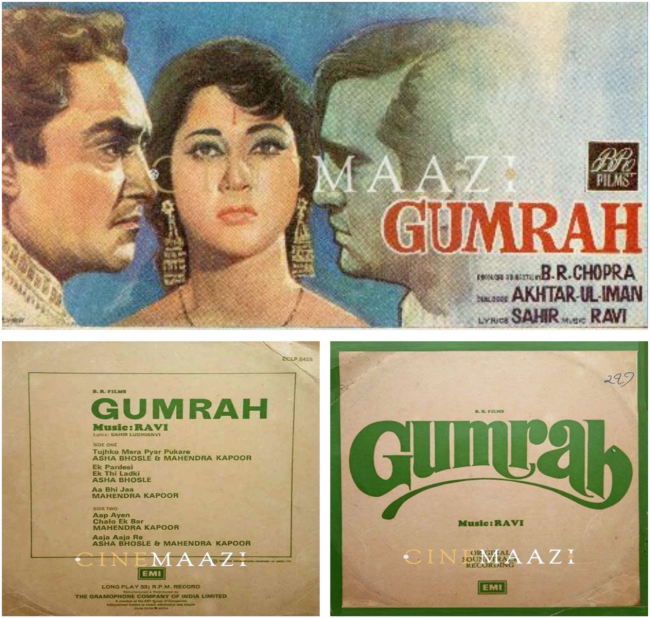
Said to be inspired by the real life love story of Dilip Kumar and Kamini Kaushal, B R Chopra’s unconventional romance film takes a gentle, sympathetic look at the three protagonists locked in a triangle of unhappiness. It portrayed the uncomfortable yet all-too-real circumstances of a woman going gumraah or astray, in a manner that was surprisingly bold for its times. The film tells the tale of Meena (Mala Sinha) and Rajendra (Sunil Dutt), a young, madly in love couple whose wedding plans are thwarted when her sister dies in an accident and she ends up marrying her brother-in-law out of a sense of duty to her niece and nephew. This marriage of compromise puts paid to her romantic aspirations; not only does she lament the loss of her first love but also feels neglected by her older lawyer workaholic husband. When she re-encounters her erstwhile lover while on a holiday visit to her hometown, the sparks fly again…and she is unable and unwilling to put the brakes on her extramarital involvement. Even as she tries to keep her clandestine affair a secret from her spouse, she becomes a victim of blackmail. The film was a bold and courageous exploration of a woman’s desire, as her feelings for her former lover clashed with her duty to her husband and family.
Amrapali (1966)

This sensual Lekh Tandon directorial revolved around a courtesan who both embraces and rejects worldly pleasures. Set in 500 BC, this historical recreated the legendary romance between the royal courtesan of the capital of the Licchavi republic of Vaishali - Amrapali (Vyjayanthimala) and Ajatashatru (Sunil Dutt) - the emperor of Magadha. Courtesans, as author Ruth Vanita notes in her book Dancing with the Nation, were “the first group of single working women in films". Unconstrained by the patriarchal family, they could develop unconventional relationships, in addition to expressing sexuality. This is seen to great effect in Amrapali’s relationship with the king, which develops while he is incognito and wounded. Whether it’s him clutching her bare shoulder, telling her she is very beautiful, to the song Tadap yeh din raat ki which has them reclining on a bed, the eroticism is not shied away from. When the king’s real identity is revealed, being a true patriot, she breaks off ties with him but is declared a traitor by the ruler of Vaishali. Sentenced to life in a dungeon, she is to be killed shortly. An enraged Ajatashatru storms Vaishali and virtually burns the city down, to rescue his beloved. But Amrapali has changed. She is horrified by the violence and blood spilled on her account by her lover, and chooses to surrender herself to Gautama Buddha. Ajatashatru also follows her lead. Renouncement is sometimes the only solution.
Bandini (1963)
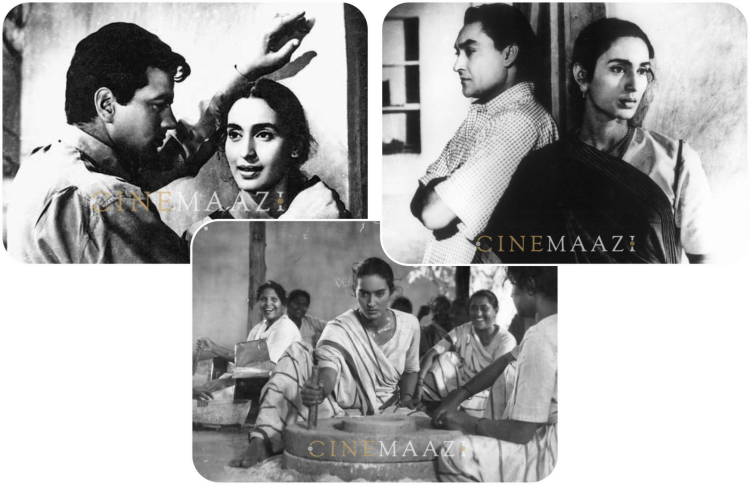
This Bimal Roy subtle classic was based on the Bengali novel Tamasi by Jarasandha (Charu Chandra Chakrabarti). It showcases the story of Kalyani (Nutan), a girl bound by love in all its destructive and redemptive powers. Imprisoned on the charge of wilful murder, she is outwardly subdued but beset by an inner conflict. Her beauty and selflessness demonstrated when she volunteers to take care of a patient suffering from an infectious disease, catches the attention of the young, handsome prison doctor Deven (Dharmendra). Her back story reveals how she has been influenced by her principled father. When Bikash Ghosh (Ashok Kumar), a revolutionary, comes into her village and her life, she does everything she can to save his life, including pretend to be his wife. He seems to reciprocate her feelings, but then leaves to never return. Taunted by the villagers, she leaves home for the big city, where she finds work in a nursing home. Imagine her shock when she discovers that the neurotic, demanding woman whom she attends to, is actually Bikash’s wife! Inflamed by news of the death of her father who had come in search of her, she cracks and reaches for the bottle of hospital poison while preparing tea for her charge… Dr Deven is eager to marry her after she serves her prison term but she is not yet free of the past. The sight of an ill Bikash embarking on a boat journey tugs at her heart strings. She learns of the reasons why he jilted her, and makes her difficult choice. And finally, Kalyani evolves from being a prisoner of destiny to defining her own freedom.
Guide (1965)
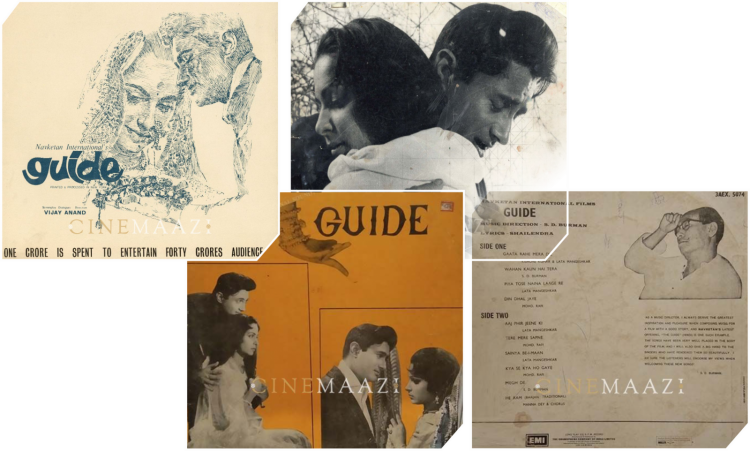
Aaj phir jeene ki tamanna hai… These Shailendra-penned lines encapsulate the bubbling happiness of Rosie (Waheeda Rehman), who breaks free from the shackles of a loveless marriage to rediscover her identity and find love and understanding in the arms of the tourist guide Raju (Dev Anand). Raju’s love and support gives Rosie the courage to defy societal norms by leaving the oppressive atmosphere of her husband's house and moving into Raju's abode. Director Vijay Anand subverted the issue of adultery minus the usual tropes, as he fleshed out the flawed and incredibly relatable characters of a married woman and her lover. Theirs is a tempestuous relationship, gradually denuded by her professional success and Raju’s resultant insecurity. He turns to drinking and gambling. Their once heady romance is marred by sparring over who is responsible for her success, after she points out that a man should not live on a woman’s earnings. He goes from serving time in jail for a cheque he forges in her name, to rejecting his earlier life, being mistaken for a holy man and finally finding redemption as a martyred mystic. The film, based on R K Narayan’s eponymous novel, remains memorable for its “daring tale of worldly passion and spiritual transcendence.”
Teesri Kasam (1966)
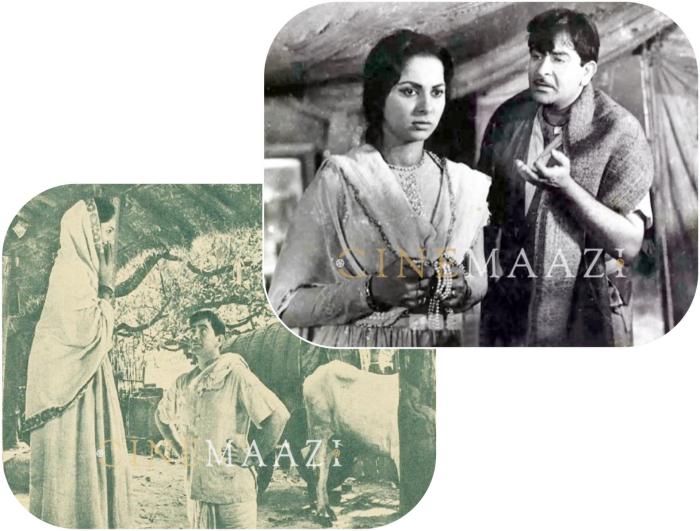
“The way the cart driver and nautanki dancer meet, talk and discover each other and themselves at the same time and the manner in which they part are like a poem on celluloid with a thread of pain running through it” – thus was this Basu Bhattacharya-directed tale of cultural clashes and unrealised love reviewed despite its tragic fate at the box office. Produced by lyricist Shailendra, it was based on the short story Mare Gaye Gulfam by the Hindi novelist Phanishwarnath Renu. It depicted the wistful and intimate bond that grows between a naïve bullock-cart driver, Hiraman (Raj Kapoor) who falls for a travelling courtesan, Hirabai (Waheeda Rehman) in the course of their journey. She is drawn to his simple philosophy of life and his natural aesthetic sense which he expresses through his moving songs. He is not just awed by her beauty but views her as nothing less than a respectable lady, rising to her defence when she is insulted. Gradually he awakens to the harsh reality of her work verging on prostitution in society. When the local landlord and thakur solicits Hirabai, any glimmer of hope of a future together are further crushed, and Hirabai decides to leave. Bound to and by the real world, they go their separate ways. In addition to the two vows he had previously taken—to never assist a black-marketeer or transport bamboo—a sadder and wiser Hiraman takes a third promise: to never ferry a dancing girl in his bullock-cart!
Aradhana (1969)
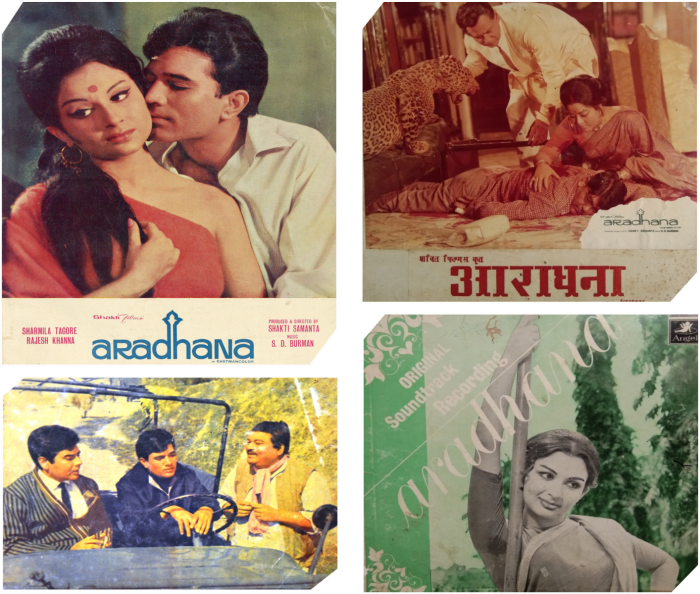
With the country seeing the Sino-Indian war of 1962 followed by the India-Pakistan war of 1965, war as a theme was also mirrored in some of the romantic films of the era. Of these, the Shakti Samanta directorial Aradhana went beyond the expected to weave a tale of unwed pregnancy. The pretty Vandana (Sharmila Tagore) and the dapper air force pilot Arjun (Rajesh Khanna), fall hopelessly in love, get engaged and even impulsively exchange garlands at a temple. A stormy night, an unplanned seduction and he leaves with the promise that they will be formally wed as soon as he returns from a flying trip to Delhi. Fate decrees otherwise and he dies in an air-crash, setting off a trail of unfortunate events for the now-pregnant Vandana. Her secret marriage is mocked by Arjun’s family and she is denounced as a loose woman. But she is made of sterner stuff and goes against the diktats of a conservative society, determined to fulfil her dead lover’s wish of raising their child to be an air force pilot. She experiences a lifetime of hardship from serving incognito as her child’s nursemaid in his adoptive home, to serving a prison sentence on his behalf. Redemption comes when her grownup son Suraj (also played by Khanna) realises that Vandana is his mother and acknowledges her enormous sacrifice in public. The film conveyed the message that love and passion are not ‘dirty’ words as well as that a child born out of wedlock is not a matter of shame either.
It is perhaps only expected that many of the films discussed above were not welcomed with gusto at the box office, which was largely male-dominated at the time. Despite their emotional depth—or perhaps on account of it!—they were unable to find the universal acceptance that more uncomplicated fare received. Sahib Bibi Aur Ghulam failed commercially, deemed too dark to have ‘entertainment value’. Teesri Kasam’s disastrous reception brought on the premature demise of its heartbroken poet-producer Shailendra who was simply unable to cope with its cold dismissal. Despite its high critical acclaim, Bandini was only the tenth-highest grosser of the year and was declared a ‘semi-hit’. Yet today, these are amongst the very films that do Indian cinema proud!



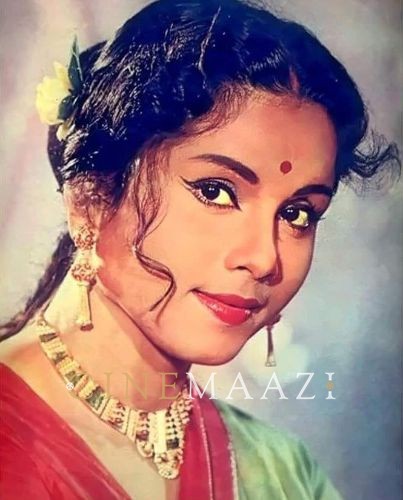
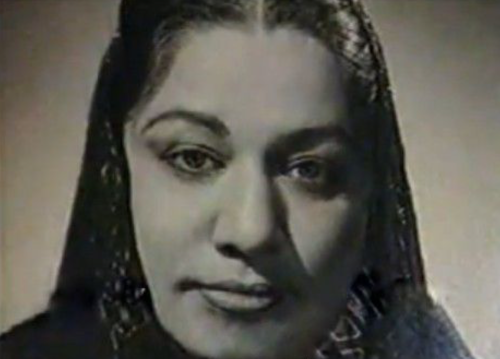
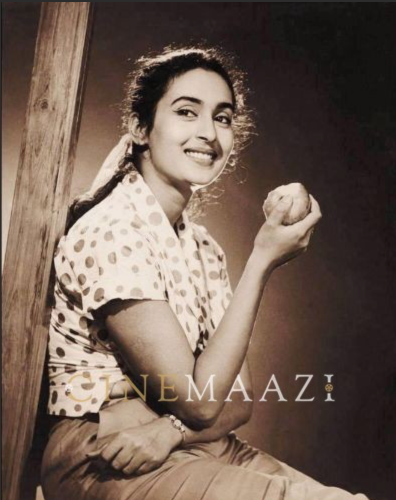
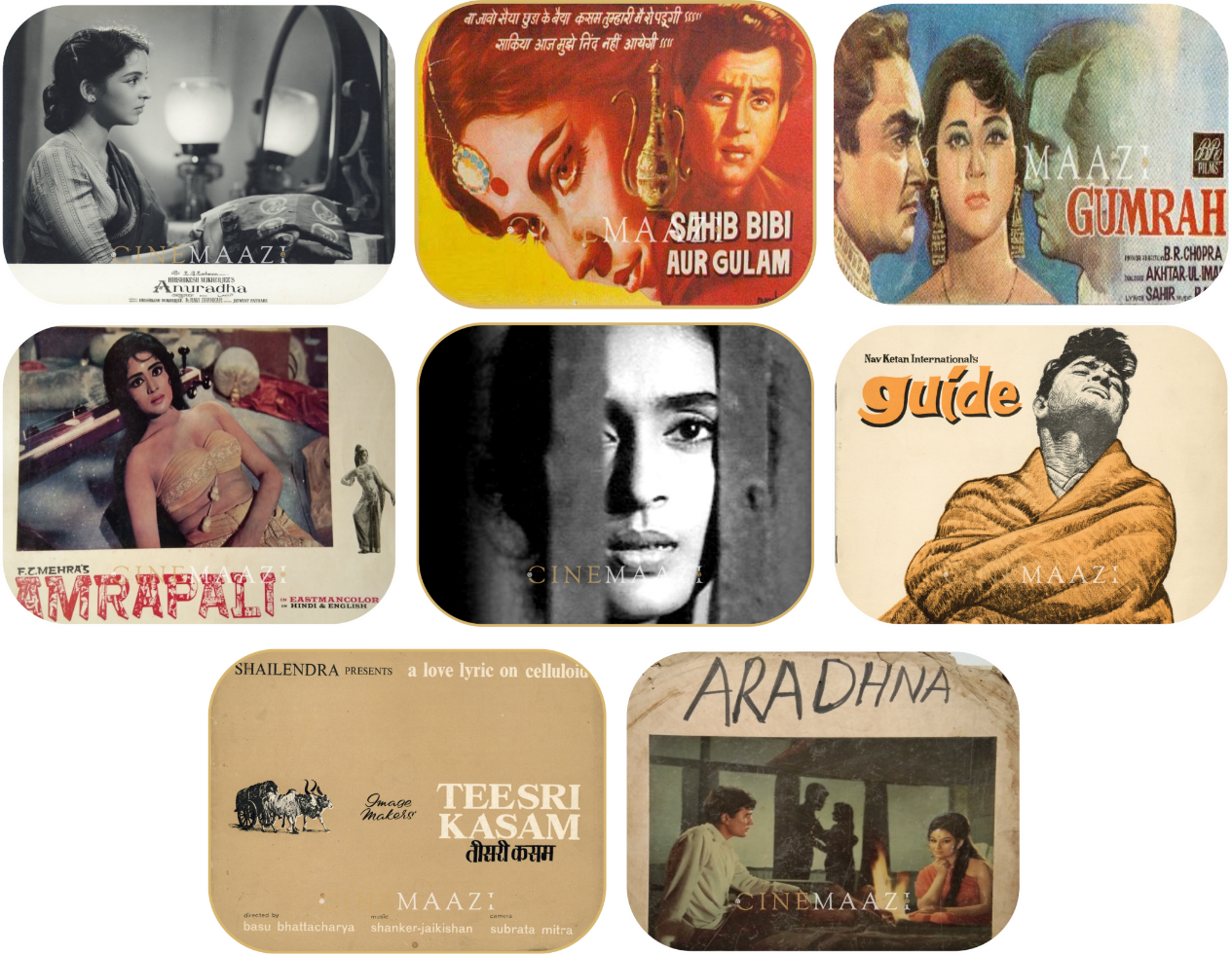

.jpg)


